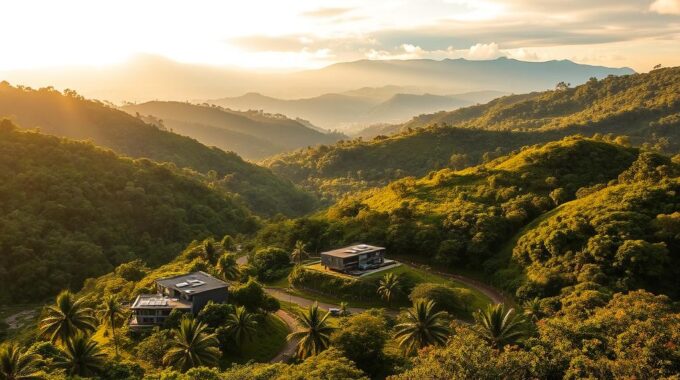Discover how to access significant funds with a Home Equity Loan Costa Rica. We offer competitive rates, flexible terms, and lower fees. Simplify your financing process today.

Discover How to Fund-Your-Land-Development-Project in Costa Rica
Costa Rica offers a unique blend of natural beauty and investment opportunities, making it a dream destination for foreign investors looking to develop land and property.
The country’s stable political environment and robust legal protections for foreign investors create a favorable climate for real estate investment. With its emphasis on eco-tourism and sustainable living, Costa Rica presents opportunities for financial returns and a peaceful lifestyle.
We will explore the challenges foreigners face when seeking financing for property development and discuss creative alternatives, including using home equity as a viable funding solution for your project. By connecting borrowers with private lenders, we offer competitive rates and flexible financing options.
The Costa Rican Real Estate Investment Landscape
Costa Rica’s real estate market is becoming increasingly popular among foreign investors due to its unique blend of natural beauty and investment opportunities. The country’s stunning landscapes, ranging from pristine beaches to lush rainforests and serene mountains, make it an ideal location for those who love nature and are looking to invest in a paradise.

Why Costa Rica Attracts Foreign Investors
Costa Rica’s stable political environment, coupled with its commitment to environmental sustainability and eco-tourism, creates a unique and attractive investment landscape. Foreign investors are drawn to the relatively affordable land prices compared to North American markets, offering strong potential for appreciation as development continues. For instance, investing in crypto-based private mortgage borrowing in Costa can provide innovative financing options.
Understanding Property Ownership Laws for Foreigners
Costa Rica’s Constitution guarantees equal property rights for citizens and non-citizens alike, making it refreshingly straightforward for North Americans to invest. The National Public Registry ensures transparency and security for buyers by recording all property transactions. However, it’s essential to understand the Maritime Zone Laws, which affect coastal properties, and the common practice of corporate ownership structures. These foundational aspects of Costa Rica’s real estate landscape are crucial before exploring financing options for your development project.
Traditional Financing Options and Their Limitations
As foreign investment in Costa Rica’s real estate continues to grow, understanding the traditional financing landscape becomes increasingly important. While Costa Rica offers attractive investment opportunities, the traditional financing options come with their own set of challenges, particularly for foreign investors.
Local Bank Loans: Requirements and Challenges
Local bank loans in Costa Rica are available for development projects, but the requirements and process can be daunting for foreign investors. To qualify, one must typically provide extensive documentation, including proof of steady income, tax returns, detailed investment plans, and local references. The approval process can be lengthy, often taking months, and the outcome is frequently a rejection. Moreover, the interest rates are generally 3 to 5% higher than those in North America, and the closing costs can be as high as 3% of the loan amount.
- Extensive documentation is required, including financial statements and local references.
- The approval process is lengthy and often results in rejection.
- Interest rates are higher compared to North American standards.
- Closing costs are significantly higher, adding to the overall expense.
Why Most Foreigners Choose Alternative Financing
Given the challenges associated with traditional bank loans, many foreign investors turn to alternative financing methods. The high costs, lengthy approval process, and stringent requirements make traditional financing less appealing. Alternative financing options offer more flexibility and faster approval times, enabling investors to move forward with their development projects more efficiently.
The conservative lending practices in Costa Rica, while contributing to the country’s financial stability, create significant barriers for foreign investors. Understanding these limitations is crucial for investors to make informed decisions about their financing options.
How to Fund Your Land Development Project in Costa Rica Using Home Equity

Home equity loans offer a practical way to fund land development projects in Costa Rica, bypassing traditional financing hurdles. We connect borrowers with private investors and lenders, providing competitive rates, lower fees, and flexible financing options compared to traditional banks. By using your existing property as collateral, you can access significant funds with easier qualification requirements.
Using Your Property as Collateral: The Process Explained
The process of securing a home equity loan in Costa Rica involves several key steps. First, your property will be valued to determine its equity. Then, legal documentation will be required to secure the loan. We work with secure third-party facilitators like Secure Title Costa Rica to handle these transactions, ensuring that both lenders and borrowers are protected under Costa Rica’s strong mortgage laws.
For example, if a seller agrees to carry a note, the buyer will close on the property and become the legal owner, while the seller will carry a mortgage or legal trust against the property until the balance is paid off. This process provides security for both parties, as the seller is assured that the buyer cannot sell the property without paying off the loan, and the buyer is assured that the lien will be removed upon payment.
Benefits of Home Equity Loans vs. Traditional Financing
Home equity loans offer several advantages over traditional financing options. They typically have faster approval processes, more flexible qualification requirements, and potentially lower fees. Private lenders assess loan-to-value ratios when determining loan amounts and interest rates for Costa Rican property-backed loans, allowing for more tailored financing solutions.
By leveraging home equity, developers can move their projects forward on timelines that would be impossible with traditional bank financing. This gives investors a competitive advantage in the market. For more information on long-term hard money loans in Costa Rica, you can visit our detailed guide.
Creative Financing Alternatives for Foreign Investors
Foreign investors looking to develop land in Costa Rica have several creative financing alternatives beyond traditional bank loans. These options provide flexibility and can be more accessible than conventional financing methods. We will explore these alternatives to help investors make informed decisions.
Developer and Owner Financing Options
Some developers in Costa Rica offer in-house financing options, making it easier for foreign investors to purchase land directly from them. This can be an attractive option as it often comes with more favorable terms and a streamlined approval process. Additionally, some private sellers are open to owner financing arrangements, where they carry short-term notes, accounting for approximately 20% of real estate transactions in recent years.
Self-Directed IRAs for Property Investment
One of the easiest ways to purchase an investment property in Costa Rica is by using a Self-Directed IRA. Investors can convert their current IRA or 401k into a Self-Directed IRA, allowing them to control their investments. This process is relatively simple and can be completed within 30 days through most trust companies.
Leveraging Equity Lines of Credit from Your Home Country
Another financing option is to tap into the equity of property back in your home country. Many buyers can obtain an Equity Line of Credit with their bank, taking advantage of low interest rates and rising home values. This allows investors to access funds to pay cash for their property purchase in Costa Rica, providing a straightforward and efficient financing solution.
Each of these creative financing alternatives has its advantages and considerations. By understanding these options, foreign investors can determine the best approach for their specific land development project in Costa Rica. Whether through developer financing, owner financing, Self-Directed IRAs, or equity lines of credit, investors have multiple pathways to fund their projects.
GAP Equity Loans: Your Connection to Private Lenders

GAP Equity Loans offers a viable solution for foreign investors seeking to fund their land development projects in Costa Rica. By connecting investors with private lenders, GAP Equity Loans facilitates development funding that might otherwise be inaccessible through traditional channels.
Loan Terms: From $50,000 to $1,000,000
GAP Equity Loans provides loan amounts ranging from $50,000 to $1,000,000, making this option suitable for both small-scale renovations and major development projects. Interest rates start at 12% and are determined based on the loan-to-value ratio, among other factors. Loan terms are flexible, ranging from 6 months to 3 years, allowing investors to tailor the financing to their project timelines.
Application Process and Qualification Requirements
The application process for GAP Equity Loans is streamlined compared to traditional bank financing, with fewer documentation requirements and faster approval timelines. Qualification requirements focus on property value and equity rather than extensive personal financial documentation. This approach makes it easier for foreign investors to secure funding for their Costa Rican projects. For more information on the qualification requirements, you can visit Understanding Home Equity Loan Qualifications in Costa.
By leveraging GAP Equity Loans, foreign investors can access the capital needed to bring their land development projects to fruition, taking advantage of Costa Rica’s thriving real estate market.
Conclusion: Turning Your Costa Rican Development Dreams into Reality
With the right approach, funding your land development project in Costa Rica can become a tangible reality. Throughout this article, we’ve explored various financing options that make Costa Rican development accessible to foreign investors. From traditional bank loans to creative alternatives like GAP Equity Loans, there’s a financing solution to suit every project’s needs.
We’ve highlighted the importance of working with experienced professionals who understand both Costa Rican real estate laws and the unique financing challenges faced by foreign investors. By leveraging these resources and exploring alternative financing options, you can overcome the hurdles that often slow down land development projects. For more information on financing options, visit our topics of interest page.
As Costa Rica’s property market continues to grow, opportunities may not last indefinitely. We encourage you to take action on your development dreams and explore the financing options that can make your project a success. By doing so, you’ll be well on your way to turning your Costa Rican land development dreams into a thriving reality.
Article by Glenn Tellier (Founder of CRIE and Grupo Gap)



